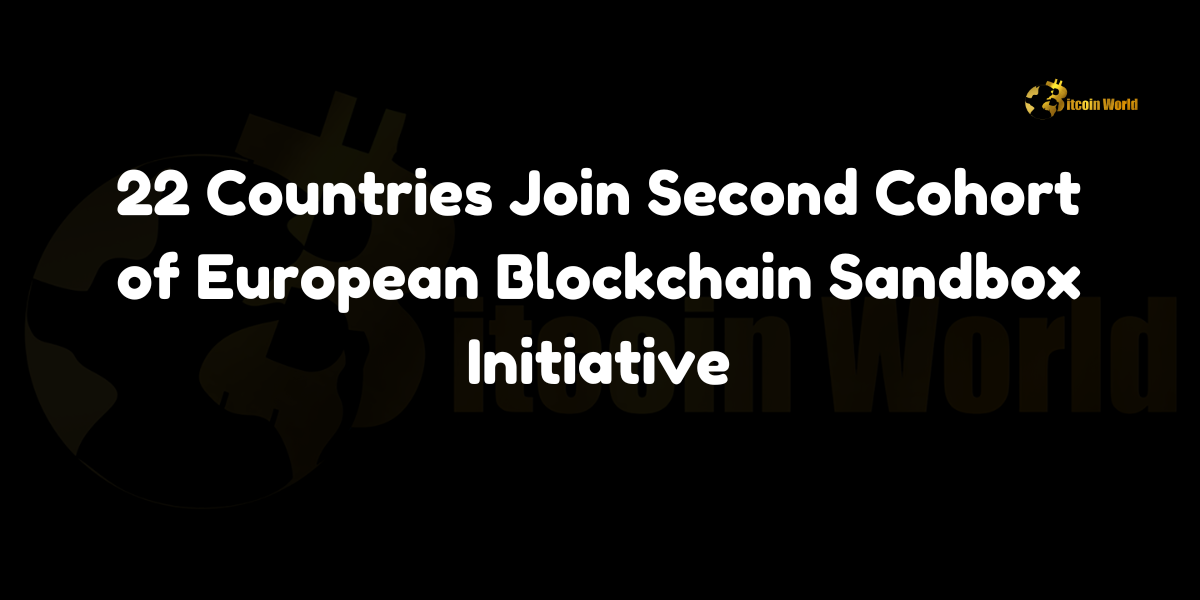22 Countries Join Second Cohort of European Blockchain Sandbox Initiative
The European Blockchain Sandbox Initiative (EBSI) is gaining momentum, with 41 regulatory authorities from 22 countries now part of its second cohort. This initiative, supported by the European Commission, aims to provide a collaborative space where blockchain developers and regulators can work together to navigate the evolving legal and regulatory landscape surrounding blockchain technology. The inclusion of major European nations like France, Spain, Germany, and Italy further strengthens the initiative’s reach and influence.
EBSI’s Focus on Blockchain Use Cases
The European Blockchain Sandbox Initiative was created to foster blockchain adoption in Europe by bridging the gap between innovators and regulatory authorities. By providing a neutral, regulatory-friendly environment, the EBSI allows blockchain projects to engage in dialogue with regulators, addressing potential legal hurdles and ensuring compliance with European standards.
The initiative supports 20 blockchain projects annually, offering legal advice, regulatory guidance, and other key resources to help projects overcome barriers and refine their technological applications. These projects, often at the forefront of blockchain innovation, range from digital identity solutions to real-world asset tokenization.
Prominent Projects in the Second Cohort
This second cohort has attracted significant attention from prominent blockchain projects, including Iota, a well-known distributed ledger technology (DLT) company. Iota’s involvement is expected to bring considerable expertise in areas such as digital passports and the tokenization of real-world assets—two use cases that could revolutionize both supply chain management and digital identity verification across the EU.
The blockchain-based digital passports initiative aims to enhance security and convenience in cross-border travel and identity management, while the tokenization of real-world assets could enable new financial products, improve liquidity, and provide transparent ownership records. Both of these projects align with the broader goals of digital transformation and economic modernization within the European Union.
Regulatory Cooperation: A Key to Success
A central goal of the EBSI is to create a framework where blockchain innovators can work closely with regulatory authorities. With 41 regulatory bodies from 22 countries participating, the initiative provides unprecedented opportunities for dialogue between blockchain companies and regulators. The sandbox format allows participants to explore legal challenges, test solutions, and gain valuable feedback from regulators before bringing their products to market.
The European Blockchain Sandbox also serves as a testing ground for future blockchain regulations, allowing European authorities to gather insights from real-world projects. By identifying regulatory gaps and providing practical guidance, the initiative helps shape a regulatory environment that is both innovation-friendly and protective of consumers.
Countries Participating in the Second Cohort
The diversity of countries involved in the second cohort highlights the broad interest across Europe in fostering blockchain innovation. Major economic players like France, Spain, Germany, and Italy have joined the initiative, alongside smaller but equally committed nations, signaling widespread enthusiasm for blockchain technology and its potential applications.
By pooling resources and expertise from across the continent, the EBSI helps ensure that Europe remains a competitive force in the global blockchain industry. With a united approach, European countries aim to create a cohesive regulatory environment that supports blockchain adoption and ensures that companies have the necessary tools to navigate the complex legal landscape.
Blockchain’s Role in Europe’s Future
Blockchain technology is poised to play a significant role in Europe’s digital transformation strategy. By enabling decentralized solutions for a wide range of industries—from finance to healthcare—blockchain has the potential to increase efficiency, enhance transparency, and reduce fraud. Moreover, the technology aligns with Europe’s broader goals of sustainability, data protection, and technological innovation.
With initiatives like the EBSI, Europe is positioning itself as a leader in blockchain adoption, ensuring that the continent remains competitive on the global stage. By supporting projects that address real-world challenges, the EBSI is helping drive the development of next-generation solutions that could reshape industries ranging from finance to public services.
Legal and Regulatory Challenges: Addressing the Uncertainty
One of the most significant challenges facing blockchain adoption is the regulatory uncertainty that surrounds the technology. Different countries and regions have varying approaches to regulating blockchain projects, leading to confusion and potential legal pitfalls. The European Blockchain Sandbox Initiative aims to address these challenges head-on by providing legal advice and regulatory clarity to participating projects.
By working directly with regulatory authorities, blockchain companies can gain a clearer understanding of the legal landscape and ensure that their projects comply with European regulations. This approach not only reduces the risk for blockchain developers but also increases trust in the technology among investors, consumers, and businesses.
Looking Ahead: The Future of Blockchain in Europe
As blockchain technology continues to evolve, initiatives like the European Blockchain Sandbox will play a crucial role in shaping its future. By providing a collaborative platform where innovators and regulators can work together, the EBSI helps ensure that blockchain projects can thrive within a compliant and supportive environment.
With the second cohort now in place, the European Blockchain Sandbox Initiative is well-positioned to drive blockchain adoption across the continent. As projects like Iota’s digital passport and asset tokenization initiatives move forward, the EBSI will continue to provide the necessary regulatory framework to bring these innovations to life.
Conclusion
The European Blockchain Sandbox Initiative represents a significant step forward for blockchain innovation in Europe. By providing a platform for dialogue between regulators and blockchain developers, the EBSI helps ensure that blockchain projects can navigate the complex legal landscape while fostering innovation. As Europe continues to explore the potential of blockchain technology, initiatives like the EBSI will be key to driving its adoption and ensuring that Europe remains a global leader in the blockchain space.
Internal Link Reference:
To learn more about the innovative startups shaping the future of the crypto industry, explore our latest article on blockchain developments in Europe.
Disclaimer: The information provided is not trading advice, Bitcoinworld.co.in holds no liability for any investments made based on the information provided on this page. We strongly recommend independent research and/or consultation with a qualified professional before making any investment decisions.




